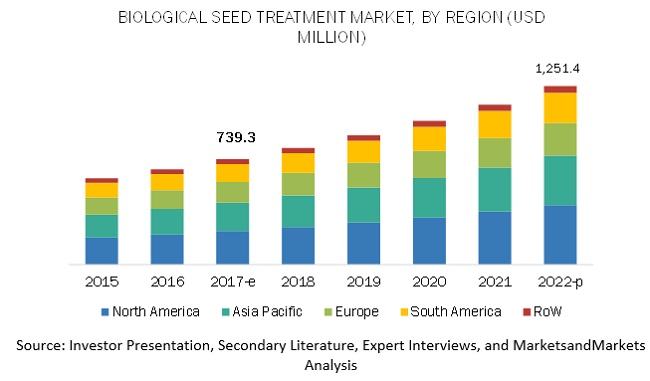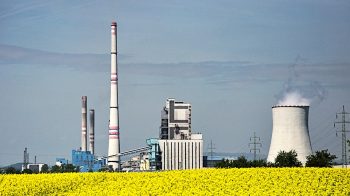The report “Biological Seed Treatment Market by Type (Microbials and Botanicals), Crop (Corn, Wheat, Soybean, Cotton, Sunflower, and Vegetable Crops), Function (Seed Protection and Seed Enhancement), and Region – Global Forecast to 2022″, The biological seed treatment market is projected to reach USD 1,251.4 Million by 2022, from USD 739.3 Million in 2017, at a CAGR of 11.10% from 2017. The market is driven by factors such as high demand for sustainable agriculture in the global market, lesser risks of exceeding pesticide MRLs, and insurance to seed investments.

Download PDF Brochure:
https://www.marketsandmarkets.com/pdfdownloadNew.asp?id=162422288
Opportunity: Bio encapsulation technologies for improved environmental persistence
Research and developments in the field of agricultural practices have been moving toward the production of inoculants, which could eventually lead to the advent of improved and advanced formulations to ease application processes and improve the viability of products. Conventional forms of formulations, solid or liquid, lead to several problems related to the low viability of microorganisms during the storage and application process. However, this problem can be addressed by the immobilization of microorganisms. This immobilization highly improves the shelf-life and efficacy of the formulation, keeping it viable for a longer duration. Bioencapsulation technologies could also result in a controlled microbial release, thereby improving application efficacy. Such technologies have the ability of greatly improving the persistence of biological seed treatments in the soil environment and thereby, leading to a thriving market for the product.
Microbials segment is projected to be the fastest-growing from 2017 to 2022
Microbial seed treatment includes bacterial and fungal seed treatment. Seeds treatment provides an efficient mechanism for the placement of microbial inoculum in the soil environment, where they are appropriately positioned to colonize the seedling & roots and protect them against soil-borne diseases and pests. Thus, the microbials segment is projected to grow at the highest rate during the forecast period.
Request for Customization:
https://www.marketsandmarkets.com/requestCustomizationNew.asp?id=162422288
North America led the market with the largest share in 2016
North America was the largest biological seed treatment market in 2016. The streamlined guidelines, procedures, and effective feedback adopted by North American agrochemical regulatory agencies have been supportive of the product registration process as compared to Europe. North America was followed by the European market in 2016 which has also witnessed a strong adoption trend of these products.
This report includes a study of the development strategies, along with the product portfolios of leading companies. It also includes the profiles of leading suppliers such as BASF (Germany), Bayer (Germany), Syngenta (Switzerland), Monsanto (US), and DuPont (US). Some emerging players in the biological seed treatment market include Valent BioSciences (US), Verdesian Life Sciences (US), Plant Health Care (US), Precision Laboratories (US), Koppert (Netherlands), Italpollina (Italy), and Incotec (Netherlands).
Critical questions the report answers:
- Where will all these developments take the industry in the long term?
- What are the upcoming trends for the biological seed treatment market?
- Which segment provides the most opportunity for growth?
- Who are the leading vendors operating in this market?
- What are the opportunities for new market entrants?
